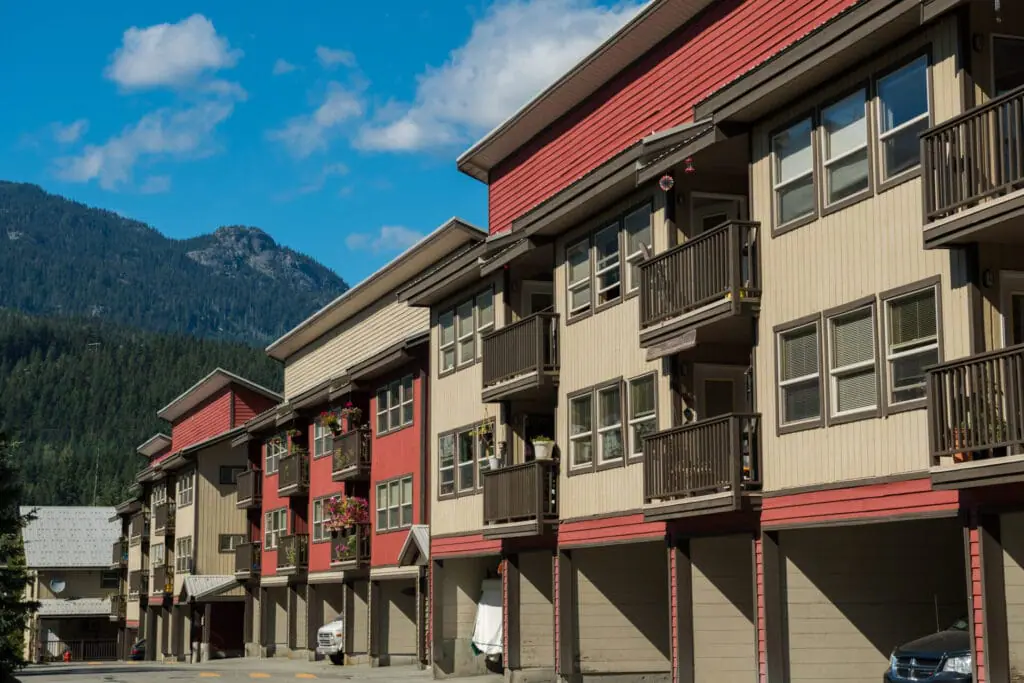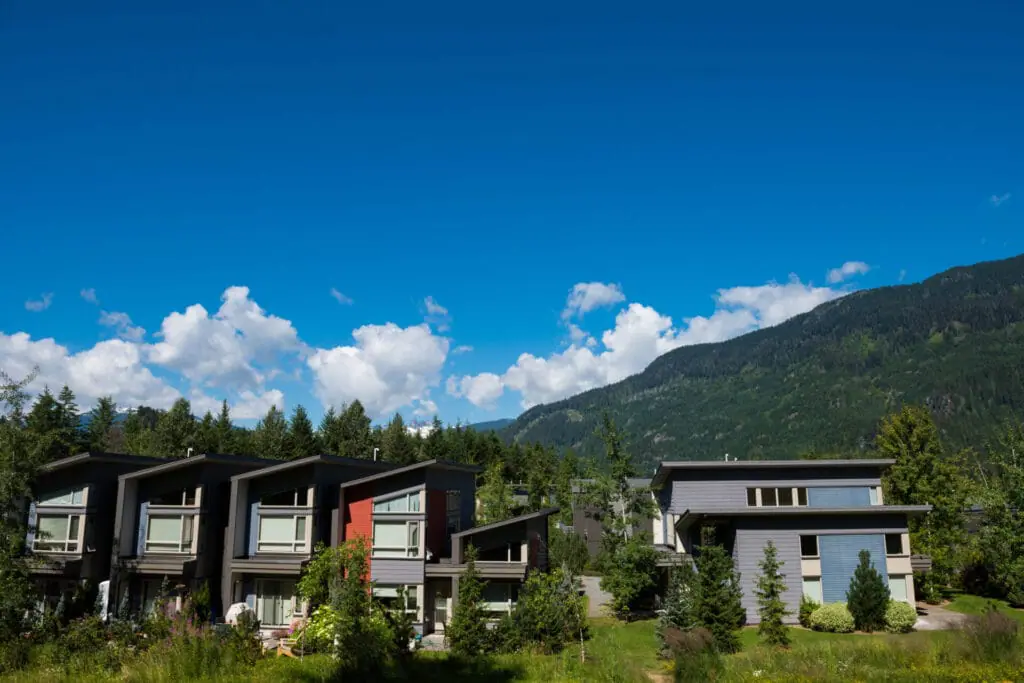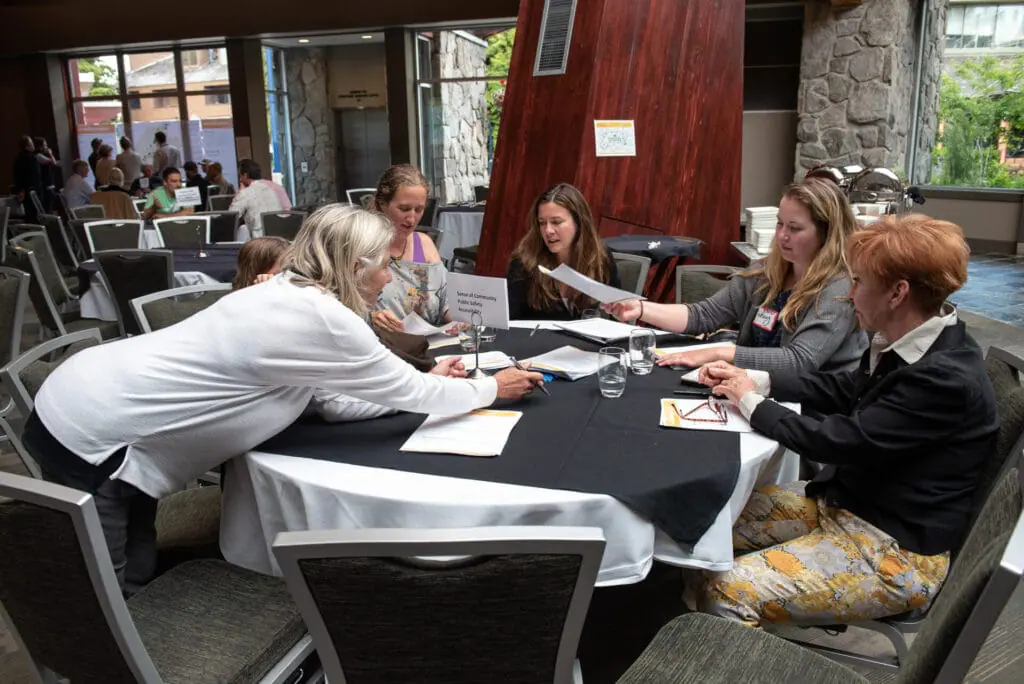Looking to get caught up on the latest from Council? We’ve pulled together some key stories from April 8, 2025 Regular Council meeting, including:
- Housing Needs Priority Application Review
- Cheakamus Crossing Lot 3 density transfer for employee housing
- OCP amendment project and engagement approach
- FE&A investments announced for third-party events
For all the details, check out the recording of the full meeting at whistler.ca.
How we’re prioritizing permit applications that meet Whistler’s housing needs

Our Building and Planning Departments receive a high volume of permit applications every year. While being committed to providing fair and equitable service to all applicants, we recognize there are applications that bring significant benefit to the community and contribute to Whistler’s housing needs.
Currently, applications advancing employee housing are prioritized for review on a case-by-case basis, with no official policy in place. Council Policy G30, adopted at the April 8 Regular Council meeting, formalizes the current practice of advancing employee housing building and development applications, increases transparency and provides clear criteria for applicants. The policy was also developed to meet the commitments laid out as part of our $2,550,853 grant agreement through Canada’s Housing Accelerator Fund.
The review criteria that applicants must meet to be considered for a priority review are listed below, in order of priority:
- Applications resulting in new emergency housing, supportive housing or transitional housing.
- Applications submitted by the Whistler 2020 Development Corporation, a subsidiary of the RMOW that facilitates the development of employee housing on municipal lands
- Applications resulting in, amending, associated with, or subject to housing agreements that result in new dwelling units being built.
- Applications for development to be constructed pursuant to our Small-Scale Multi-Unit Housing zoning amendment bylaw, a provincially legislated requirement allowing for three to four dwelling units on applicable residential parcels.
Applications may also be prioritized, at the sole discretion of the General Manager, based on their anticipated contribution to meeting Whistler’s housing needs.
For clarity, Council Policy G30 aims to reduce the wait time for prioritized applications to be reviewed by staff; it does not promise reduced processing timelines.
Learn more, and view the full report, here.
Proposed bylaw aims to optimize housing development in Cheakamus Crossing Lot 3

Mayor and Council received first three readings of a zoning amendment bylaw which, if passed, will allow for higher density development on the latest employee-restricted housing project in Cheakamus.
The goal is to build more homes for more people, optimizing the Lot 3 site for as much employee housing as possible.
“This request to allow more units on Lot 3 reduces the construction costs by bringing down the per-square-foot building cost, making the project more financially viable while supporting affordability of the employee housing units,” said planner Louis-Felix Renaud.
The 0.85-hectare parcel of land is located between the Cheakamus River, Mount Fee Road and a single-family and duplex development. It is currently zoned to allow for townhouses, for employee housing, and sits adjacent to an area slated to become a park.
The proposal calls for building a five-storey apartment block with 105 units. This includes:
- 14 studios with an average floor area of 37.87 square metres (408 square feet)
- 75 one-bedroom units with an average floor area of 49.1 m2 (529 sq. ft.)
- 16 two-bedroom units with an average floor area of 72.47 m2 (780 sq. ft.)
It would also include 20 three-bedroom townhouses in four two-storey blocks. These townhomes will be approximately 113 m2 (1,221 sq. ft.) in floor area, and the whole development would have a similar architectural style and scale as the Phase 2 neighbourhood of Cheakamus Crossing.
The apartment buildings and townhouses will be built over a common parkade with 145 resident parking stalls, while 15 visitor parking spaces will be in front of the buildings.
Parking stalls will be limited to one per apartment unit and two per townhouse to help reduce construction costs and make the project more financially viable.
The bylaw also proposes to reduce the permitted ground-floor area at 1825 Mount Fee Road (Lot 6) so the overall density of Phase 2 lands remains unchanged.
Prior to adoption of the bylaw, staff have recommended a covenant is placed on the land to ensure the proposed plans are followed, a parking management plan is established, occupancy requirements and rental rates laid out. Another condition requires completion of the neighbourhood park prior to occupancy.
How we’re approaching engagement for the upcoming amendment to Whistler’s Official Community Plan

Whistler’s Official Community Plan (OCP), which guides the long-term vision of the resort, requires minor updates by the end of 2025 to align with provincial legislative changes.
The updates are aimed at:
- Meeting new provincial housing requirements
- Remaining consistent with the Regional District’s Regional Growth Strategy
- Tidying up minor text and mapping discrepancies that have come up since it was last updated
In late 2023, the Provincial Government passed several pieces of legislation and changed planning guidelines to increase housing supply across British Columbia. Municipalities were given timelines to adjust, which Whistler met by:
- Adopting a Small-Scale Multi-Unit Housing zoning amendment to allow for building three to four units or homes on applicable residential lots, encouraging infill housing (June 11, 2024);
- Designating the Whistler Gondola Exchange as a Transit-Oriented Development Area to allow for high-density, mixed-use development within walking distance of transit hubs (June 11, 2024);
- Receiving the Interim Housing Needs Report, which identifies the anticipated housing need over the next five and 20 years using a provincial formula (December 17, 2024).
With those changes in place, the OCP must now be reviewed and updated to accommodate:
- The uses and densities permitted by the Small-Scale Multi-Unit Housing and Transit-Oriented Development bylaws.
- The number of housing units identified in the Interim Needs Housing Report to meet the 20-year need of 5,639 new units
Policies respecting each class of housing need, including rental housing, seniors housing, and housing for those at risk of homelessness, required to be addressed in the most recent Housing Needs Report.
Engagement
The public will have a chance to weigh in on the OCP as well as regional planning policy when the OCP is being reviewed.
The Regional Growth Strategy bylaw was amended last year to include new policies member municipalities must address within the next two years in their own Regional Context Statements.
The strategy itself is in place to encourage socially, economically and environmentally healthy development and make good use of public facilities, services, land and other resources. Context statements review things like how land use, transportation and solid waste policies will contribute to meeting regional greenhouse gas emission reduction targets.
As part of 2025’s planned OCP updated, Mayor and Council are legislatively required to consider early and ongoing consultation with local First Nations, the SLRD board, adjacent regional districts and municipalities, the local school district, and provincial and federal governments.
OCP workshops with community organizations including the Whistler Community Services Society, Sea to Sky Community Services, PearlSpace, Tourism Whistler, and the Whistler Housing Authority are planned, alongside one with the Housing and Strategy Committee of Council.
Community members will have the chance to provide input online, as well as through a public hearing prior to third reading of the amended OCP bylaw. The public can also learn more about the project at the June 4 Add Your Voice Engagement Forum.
“When we’re going out for engagement, it’s going to be essential that there’s clear communication on which aspects of the amendments are required and which aspects can be tailored to meet the Whistler context,” explained planner Joanna Rees. “So we’ll really be looking to focus on engagement for those aspects that can be tailored to Whistler.”
A full update to the OCP is expected in 2028, prior to which the community will have considerable opportunity for consultation.
FE&A investments announced for 2025 third-party events

Several new and returning events received funding in 2025 through our Festival, Events and Animation (FE&A) investments, announced at the April 8 Regular Council meeting.
Funded though the B.C. Government’s Municipal and Regional District Tax, which is based on hotel stays, Whistler’s events balance original programming—New Year’s Eve, Canada Day, and the Whistler Summer Concert Series—with animation programming like the Village Animation, Snow Zone, and a licensed busking program. They also include what is known as Attract, Retain and Augment (ARA) programming or third-party-produced events, an important way to fill in gaps on the event calendar during slower periods.
“Investing in third-party events is an efficient and effective way to achieve FE&A’s goals,” said Bob Andrea, manager of resort experience. “The investments we make in third-party produced events that happen [in shoulder season] are so important. We use those investments to encourage producers to activate on dates that aren’t their first pick, and we offer our support to help align with our program goals and the goals of the resort to fill those shoulder seasons.”
The FE&A program is overseen by Mayor and Council, with input annually from an advisory group of resort partners and Whistler organizations.
The FE&A team has allocated the 2025 ARA investments as follows:
- World Ski & Snowboard Festival (April): $170,000
- Whistler Cup (April): $22,000
- Whistler Children’s Festival (May): $30,000
- Run Comfy Numb (May): $2,500
- Nourish Wellness Series by Cornucopia (June): $30,000
- XFondo Whistler (June): $5,000
- Whistler Half Marathon (June): $20,000
- The Back 40 (June): $2,500
- Art on the Lake (July): $2,500
- Crankworx Whistler (August): $140,000
- Flag Stop Theatre & Arts Festival (August): $5,000
- RBC GranFondo Whistler (September): $40,000
- Whistler Village Beer Festival (September): $35,000
- Whistler X-Tri (September): $5,000
- The Witsend (September): $2,500
- Ultra Trail Whistler by UTMB (September): $25,000
- Whistler Writers Festival (October): $14,000
- Whistler 50 Relay & Ultra (October): $13,000
- Cornucopia Whistler (November): $95,000
- Whistler Film Festival (December): $50,000
- Audain Art Museum: Gathered Leaves Exhibit: $30,000
- Squamish Lil’wat Cultural Centre: Indigenous Fashion Exhibit: $75,000
To attend an upcoming meeting, check out the Council meeting Schedule. Agendas and Minutes are available online. To connect with Council, consider “Borrowing a Councillor” from the Library’s Unusual Items Collection, or get in touch with them individually by phone or email.
